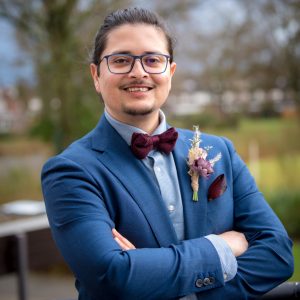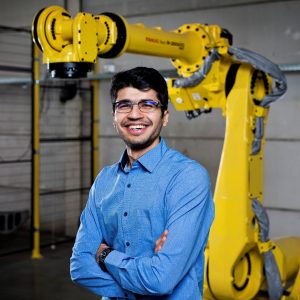Alumni Interview #April
Last month we interviewed some more alumni! We aim to post these each month so check out our news page at least once a month.

Name: Anshuman Bhattacharjee
Employer: ASML
Title: Design Engineer
Country: Netherlands
Year of Graduation: 2015
What was the title of your master thesis project? Where did you do your master thesis and who was your supervisor?
I did my MSc. thesis at TU Delft (DCSC) itself under the supervision of Prof. Gabriel Lopes. My master thesis was titled Control by Interconnection by Reinforcement Learning. You can read the thesis here if you like
https://repository.tudelft.nl/islandora/object/uuid%3A9679deed-f318-4d37-9582-c484aa573360
Abstract:
One of the interesting ways in which to describe the dynamics of complex physical processes is by port-Hamiltonian models. The benefit of doing so is that the energy function of the model already gives an indication of where the natural equilibrium state of the system is. And further, the controller can be modeled the same way and plugged into the system. One of the downsides, however, is that designing a good energy controller requires extensive experience. For my thesis, I attempted to leverage reinforcement learning to overcome this limitation by having an algorithm “learn” a suitable controller that meets certain specifications (via a cost function).
Did you have a favourite S&C course?
I have a soft spot in my heart for the practical side of things so without a doubt, my favorite course was the Integration Project we do at the end of the first year. It was a great opportunity to put into practice all the learnings of the first year and to investigate practical considerations that affect real-world controller design. The highlight for me was when my partner and I spent an afternoon trying to figure out why our controller was going to haywire only to finally trace it to a loose screw in the setup that was adding an order of magnitude of noise to the feedback encoder. A great lesson I learned that day is how to troubleshoot complex systems (always double-check the simple stuff first).
Courses that I loved and would be a close second include Digital Control (now called Control Engineering I believe) and Control Theory (one of the most difficult, yet satisfying courses I have ever followed).
What was the most difficult S&C course in your experience?
I found it to be a close tie between Filtering and Identification and Robust Control. Both of the courses required a solid understanding of the fundamentals and had more complex subject matter than I was expecting.
Which professor had the biggest impact on you?
I feel blessed to have learned from excellent professors at DCSC. My favorites would be Prof. Gabriel Lopes (who taught an excellent class on Control Methods for Robotics and was later my thesis supervisor) and Prof. Tamas Keviczky (who taught the fundamental courses on Control Theory and Digital Control).
Do you have any great memories of studying system and control at the TU Delft you want to share?
Most of my memories of studying Systems and Control revolve around group projects or assignments done at the library with classmates and friends. Even individual assignments were often done in groups in order to be able to bounce ideas off each other and help each other out. Studying together with driven and diverse individuals from across the world also kept me motivated and helped me develop some lifelong friendships.
Where do you work at the moment? And what does your typical day look like?
My current title is Design Engineer at ASML Eindhoven. I work on the EUV Source.
A regular workday for me is a healthy mix of data analysis and problem-solving (to help alleviate problems faced by our colleagues at customer sites), meetings and discussions (about design choices and how to balance solution complexity with robustness), and of course writing and reading the documentation for the work we do. I quite enjoy my work. I also help solve customer escalations regarding the performance of our machines by doing system-to-module diagnostics and that ensures I never have a dull day.
Is the study material still relevant to your daily occupations?
For me, the actual content of what I studied is not so relevant for my day to day job (since I do not actively work in control systems or design) but what I do find extremely relevant are the skills and thought processes I picked up pertaining to understanding how complex systems behave and the limitations of control systems. Especially when it comes to the question of understanding the trade-off between complexity and performance, my background in Systems and Control is indispensable.
The one lesson I find always applies to all of the engineerings is one of the first things that we learn at DCSC. Real-world complex systems are highly non-linear and the model we create is only valid within a certain range of assumptions. So it is important to understand what those assumptions are and under what circumstances they hold.
Do you have any advice for students pursuing a career in your field of work?
The fundamentals of system and control apply to a broad range of fields. So when you’re learning something, don’t just leave it as an abstract concept but try to think of how it applies to different things from everyday life.
As someone once told me, “Theory is great. Until you build it and it doesn’t work. That’s when your understanding of the theory comes into play”.
Did you do any extra-curricular activities? If so, did these aid in achieving your current title?
I did not do any dedicated extracurriculars while at DCSC. I used to do some hobby electronics/robotics out of personal interest and that was always a nice talking point with potential employers.
And I acted as a mentor for international students during my second year at DCSC. This involved helping international students adjust to life in the Netherlands and advice on selecting courses and electives. This was also a very enjoyable experience and I learned as much from the students I mentored as they did from me.
If you have any questions for Anshuman, please contact us via our email

Name: Neel Nagda
Employer: TU Delft
Title: Researcher
Country: Netherlands
Year of Graduation: 2019
What was the title of your master thesis project? Where did you do your master thesis and who was your supervisor?
I did my MSc. thesis at TU Delft, Department of Precision and Microsystems Engineering (PME), under the supervision of Dr. Hassan HosseinNia.
My master thesis was titled Variable Fractional Order PID control for Precision Positioning: A frequency Domain Approach
Did you have a favourite S&C course?
My favorite course was the Integration Project.
What was the most difficult S&C course in your experience?
I found it to be Filtering and Identification.
Which professor had the biggest impact on you?
My favorite professor was Prof. Dr. Ir. J.W. van Wingerden. I really appreciate his command on the frequency domain.
Do you have any great memories of studying system and control at the TU Delft you want to share?
The entire experience has become a great memory, the workload, the stress, the time crunch, the steep learning curves, the frantic discussion calls before assignment submissions, toiling away in study groups at Aula. This experience was life-changing for me.
Where do you work at the moment? And what does your typical day look like?
I am a Researcher in the Mechatronics group, Industrial Design Faculty, TU Delft.
There have been phases, the work is quite diverse.
When I was working with ROS, there would be days on end, when I was largely reading (almost non-existing) documentation, and trying to setup navigation stack, resolving package dependencies, debugging, debugging, debugging.
And there was a phase where I was just reading papers on fleet management and multi-robot systems.
And now there are days where I dedicate half a day to learning OpenCV and the remainder to setting up a new localization sensor for a ground robot.
Is the study material still relevant to your daily occupations?
Knowledge of ROS and Linux (learnt in Robotics Practicals) came in handy as I was working with ROS Navigation stack for major part of last year.
Trajectory planning and coordinate transforms (learnt in Robot Motion Planning) were useful in working with the robotic arm.
Knowledge of Linear Algebra picked up during the courses comes in handy here and there.
Have you worked on an interesting project lately?
I am currently working with a robotic arm, programming it to paint and working towards incorporating computer vision to enable co-painting with humans.
Do you have any advice for students pursuing a career in your field of work?
Keep learning, newer libraries, newer data driven control techniques, etc. Find a balance between what you like and what your role requires.
Did you do any extra-curricular activities? If so, did these aid in achieving your current title?
I participated in the “International Small Wind Turbine Competition 2019” as a part of TU Delft team. It did come up briefly in the interview but whether this aided in achieving my current title remains an unobservable state.
If you have any questions for Neel, please contact us via our email

